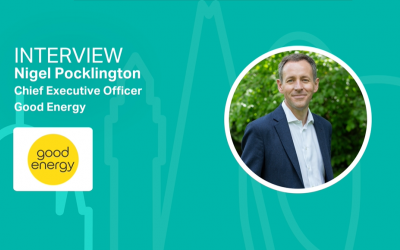Glenn Schmidt on how BMW Group is supporting the shift towards a low carbon society
Ahead of the Sustainable Innovation Forum 2019 taking place in Madrid, Spain on the 10-11th December, we caught up with Glenn Schmidt, Vice President of Government and External Affairs at BMW Group, to discuss how BMW Group is supporting the shift towards a low carbon society.

Ahead of the Sustainable Innovation Forum 2019 taking place in Madrid, Spain on the 10-11th December, we caught up with Glenn Schmidt, Vice President of Government and External Affairs at BMW Group, to discuss how BMW Group is supporting the shift towards a low carbon society.
Q. What is the current approach of the BMW Group to sustainability?
Sustainability is a question of attitude for us. It is not an add-on to business, but an inherent part of our strategy and business model.
One focus: CO2 emissions of vehicles during usage. Indeed, this is an important factor and we continuously work on reducing on-road emissions. From 1994 to 2018, we have lowered the average fuel consumption of our European new vehicle fleet by 42%, and aim to achieve a 50% reduction by next year.
But product alone is not enough: We must think beyond the product and strive for holistic sustainability, by reducing emissions from our vehicles along the entire value chain, from our production plants worldwide and across our supply chain. And this is uniquely BMW – we try to identify decarbonisation potential even in the smallest areas of our business activities.
Since 2006 we have managed to reduce the amount of energy, water and solvents to produce a vehicle by 50%, as well as the amount of waste produced, and CO2 emitted.
As of next year, all plants operated by the BMW Group, as well as the three plants of the BBA joint venture in China, will purchase electricity from 100% renewable sources. Our BMW Group plants in Europe are supplied exclusively with green electricity – and that’s since 2017. As a part of our commitment to further reduce carbon emissions along the entire value chain we have expanded our commitment towards making transport logistics more sustainable and joined the “Getting to Zero Coalition”. The objective of this initiative is to use zero-emission cargo vessels from 2030. The Getting to Zero Coalition is a partnership between the Global Maritime Forum, the Friends of Ocean Action and the World Economic Forum.
Q. What in your opinion are the biggest challenges that the transportation industry is facing regarding a low carbon society?
Mobility is equivalent to human progress – and it also relates to economic activity. We will see a rising demand for mobility in the years to come. Hence, the greatest challenge is clearly allowing for individual mobility, but finding economically viable decarbonization pathways.
The BMW Group is in the midst of a massive electrification product offensive. In 2023 we will offer 25 electrified vehicles; currently we have 12 on the market.
We are deliberately making every drivetrain technology more efficient. That will also include the internal combustion engine which costumers in many regions of this world will continue to choose. This technology has to provide a contribution to decarbonize transportation. Not investing in improving the efficiency of this technology is detrimental for the environment. There is not THE ONE solution to all customers in all markets.
As we speak, EVs are becoming more and more relevant. The market is there, and BMW plays a very strong role as one of the market leaders – by the way not only in Europe or in the US, but also in regions like Latin America, where we also conduct different projects to create the necessary conditions to make electromobility attractive for our customers. For instance, in Brazil, in collaboration with EDP and Ipiranga, we have established a fast charging corridor between São Paulo and Rio de Janeiro connecting approximately 430 km and free charging for users throughout 2019.
A challenge for us carmakers is how differently electromobility is being promoted and perceived in different countries and cities. Examples like Norway show what can be achieved with a proactive effort – we are selling close to 80% of our cars with a plug in this market. On the other hand, there is still a lack of adequate charging infrastructure in many cities and countries worldwide. This can create hesitation amongst potential customers, who would otherwise love to make the switch to electrified driving. In the end, the success of electromobility and the transition to low carbon mobility will depend on infrastructure decisions and customers’ choices. The automotive industry is undergoing a far-reaching technological transformation. As a carmaker in the forefront of technology we want to fulfill the needs of our customers and contribute to a decarbonization of the transport sector, producing cars which are fit for the future.
Q. How are you supporting the global shift towards a low carbon society?
The BMW Group is leading many initiatives and collaborations, which shift towards a low carbon and more sustainable environment – from local to global.
One of our local examples: We just announced the massive expansion of charging points for electrified vehicles at all BMW Group locations in Germany by 2021, in total 4,100. This charging infrastructure enables employees to charge their cars conveniently at their workplace. Charging options at work are becoming increasingly important as more and more people use electrified vehicles, and not everybody can easily charge at home.
The BMW Group is a part of setting standards in terms of charging infrastructure. In 2017, we and other partners, founded the joint venture IONITY, a pan-European high-power charging network that enables electric mobility over long distances. IONITY will construct and operate around 400 rapid charging stations with charging capacities of up to 350 kW along the main traffic axes in Europe by 2020.
We have entered several strategic partnerships with cities, for instance with the city of Hamburg, where we are expanding our electrified car sharing fleet, increasing the number of charging points and offering a significant number of dedicated parking places for these vehicles.
Q. BMW Group once again joins the annual Sustainable Innovation Forum as headline partner during COP. What will be your message at the Forum this year?
Our commitment to the Sustainable Innovation Forum has a unique tradition – and that is for good reason.
It becomes more and more apparent that solving the climate problem only works through collaboration. You need partners for such a challenge, and hence we seek these partnerships constantly. Think logistics, energy supply for production, charging infrastructure or battery cell production – there is no business sense in pursuing these activities on our own.
SIF is an ideal place to foster these partnerships and learn from each other. This means dialogue and exchange, at times also controversy. And as we have been a player in sustainability for decades, we can contribute to the debate, sharing our experiences with regards to scaling technology and fostering innovation. We have learned quite a lot when it comes to sustainability in the value chain and with bringing electric vehicles to the market – and we are happy to share with and also learn from others. And that is the reason why the BMW Group is at COP and at SIF.
BMW Group is the Headline Partner of the upcoming 10th annual Sustainable Innovation Forum taking place alongside COP25, 10-11 December in Madrid, Spain. To learn more about the agenda, the panels, the speakers and how to register, visit the event's official website here.


_400_250_s_c1.png)



_400_250_s_c1.png)